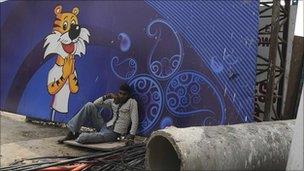India's race to avoid Games calamity
- Published
Sanjoy Majumder looks at the frantic preparations taking place in Delhi for the Commonwealth Games
Next to the Commonwealth Games village, last-minute preparations are on at an athletics practice facility as armed police keep a close watch.
In fact, the security is almost oppressive. Armed commandoes are in position all along the road leading to the village.
Others are on the lookout from watchtowers on the perimeter. Last Sunday's shooting in Delhi's old city - in which two Taiwanese tourists were injured - is still fresh in everyone's mind and the Commonwealth venues are under virtual lockdown.
Even the policemen are conscious that India's reputation is on the line.
"Please tell the world it's OK to come," one of them tells me.
"All of you have been exaggerating the extent of the problems. Our national pride is at stake, don't let it down."
But that is a sentiment not everyone shares.
Filthy
The Games Village is still out of bounds but the BBC has managed to get hold of pictures from inside showing the conditions.
They show filthy toilets with wash-basins and walls stained with betel leaf (chewed and spat out by contruction workers), bedrooms in a mess and flooded apartments, a result of all the heavy rain Delhi has experienced over the past few weeks.
Extra cleaning crews have been pressed into service and Delhi Chief Minister Sheila Dikshit has been in to take stock.
Even outside the area, workers are busy fixing the pavements, making sure the plants are in place and generally cleaning up.
Despite the sense of urgency there is a growing feeling, especially among some from the visiting teams, that it has been left a little too late.
There has been a constant stream of visitors, representatives of the participating nations, trying to assess the situation and feed the information back home.
Members of the Malaysian high commission are the latest to arrive, pulling up in a black limousine and being waved inside by the security guards.
Although most of the initial criticism of the facilities came from Western countries, including England, Scotland, Canada and New Zealand, other nations including some of the smaller ones are also monitoring the situation.
It has forced Indian Prime Minister Manmohan Singh to call a crisis meeting of top ministers and officials to get a handle on the situation.
Scathing
His government is coming under intense criticism, not just from the international community, but increasingly from a furious Indian public.
In online polls carried out by national newspapers, radio call-in shows, blogs and television news programmes people are scathing in their criticism.
Many are particularly incensed at the insensitivity shown by one of the senior members of the Games' organising committee, Lalit Bhanot, when he dismissed the concerns of many of the participating nations, putting them down to "different standards of hygiene" in the West.
"Does he mean we are happy living in filthy conditions?" one angry viewer asked on a TV show.

Many Indians fear their international standing will be left in tatters
Others have been asking why things have come to such a pass with India's global standing taking a beating.
There are still some who think India can pull it off.
But a walk just beyond the Games Village makes you want to question their optimism.
The village has been built close to the Yamuna river which flows through Delhi. The incessant rain over the past few weeks has flooded much of the area.
From the road you can make out the gleaming towers of the village in the distance, across what seems to be an enormous lake - water that has collected over the past month.
And, on the road, people are living in makeshift tents having been moved from lower ground.
With talk of further rain and the level of the river rising even higher, it looks likely that more problems are on the way.
- Published23 September 2010
- Published22 September 2010
- Published9 September 2010
- Published22 September 2010
- Published23 September 2010
- Published3 September 2010
- Published21 September 2010